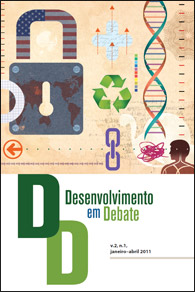A volta do Estado: aprendendo com os BIC? O Estado de transformação: volta, renovação, ou redescoberta?
Palavras-chave:
Papel do Estado, Estado Desenvolvimentista, Estado Híbrido, BIC, Estados UnidosResumo
A crise financeira global expôs a fraqueza da teoria econômica dominante e de políticas desregulatórias, maculou o modelo de laissez-faire do capitalismo, e precipitou uma reavaliação generalizada do papel do estado no controle do mercado. Enquanto a experiência dos BICs que oferece um poderoso modelo de ativismo do estado que transcende o Consenso de Washington, está em boa companhia. Um exame das experiências do passado e do futuro do Nordeste da Ásia (NEA) e dos Estados Unidos contesta, por um lado, vários mitos relativos ao pretenso desaparecimento do estado desenvolvimentista, e por outro, a chegada de um estado neoliberal. Enquanto o NEA oferece um modelo bem estudado do avanço industrial (catch-up) orientado pelo estado, que o neoliberalismo teria relegado ao lixo da história, os Estados Unidos fornecem um modelo substituto de supremacia tecnológica patrocinado pelo estado, que poucos desejam reconhecer.
Downloads
Referências
BLOCK, Fred 2010: The State of Innovation. Paradigm Publishers.
CHADWICK, Bruce P. 2005: Information and Communication Technologies and Economic Development in the Republic of Korea. In A.Y. Mansourov (ed) Bytes and Bullets: Information Technology Revolution and National Security on the Korean Peninsula, Asia-Pacific Center for Security Studies: Honolulu, HI: 52-69.
CIEPLY, D. 2005: Why the State Was Dropped in the First Place: A Prequel to Skocpol’s
‘Bringing the State Back In’.
CONGRESSIONAL BUDGET OFFICE 2011: Trends in the Distribution of Household Income between 1979 and 2007. October. Washington DC. Online version.
FRISCHTAK, C. R. 2011: ‘Comparative Advantages, Innovation and Green Economy’.
FONG, glenn R. 2001: ARPA Does Windows: The Defense Underpinning of the PC Revolution. Business and Politics, 3(3): 213-237.
JOHNSON, C. 1982: MITI and The Japanese Economic Miracle. Stanford University Press.
KIM, S-Y. 2010: Transitioning from fast-follower to innovator: The institutional foundations of the Korean telecommunications sector, Review of International Political Economy, October: 1-29.
RODRIK, D. 2010: The Return of Industrial Policy, Project Syndicate, 12 April. Online: www. project-syndicate.org/.../the-return-of-industrial-policy.
THURBON, E. 2011: ‘Why the Declinists are Wrong: (Mis)-Constructing the 1970s Authoritarian Korean State as The Developmental State Model’. Paper presented at the ISA Asia-Pacific Regional Section Inaugural Conference University of Queensland, September 29-30, Brisbane, Australia.
WEISS, L. 2010: ‘The State in the Economy: Neoliberal or Neoactivist?’ In Oxford Handbook of Comparative Institutional Analysis, edited by John Campbell, Colin Crouch, Peer Hull Kristensen, Glen Morgan, Ove Kai Pedersen and Richard Whitley. Oxford: Oxford University Press.
WEISS, L. 2012a: The Myth of the Neoliberal State. In Developmental Politics in Transition: The Neoliberal Era and Beyond, edited by Chang Kyung-Sup, Ben Fine, and Linda Weiss.
Macmillan Palgrave (in press).
WEISS, L. 2012b: ‘Hybrid State, Hybrid Capitalism: National Security Sources of American Innovation and Enterprise.’ Book manuscript in draft.Weiss, Linda 2011c: Merging Commerce and Security through Innovation Hybrids. In Ronnie D. Lipschutz & Shelley L. Hurt (ED) Hybrid Rule and State Formation: Public-Private Power in the 21st Century. Cambridge University Press (under review).
WEISS, L. 2012c: ‘U.S. Technology Procurement in the National Security Innovation System. In Tarmo Kalvet, Rainer Kattel and Veiko Lember (eds) Public procurement for innovation policy: International perspectives. Springer Press.
Downloads
Publicado
Edição
Seção
Licença

Este trabalho está licenciado sob uma licença Creative Commons Attribution 4.0 International License.

